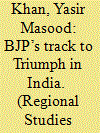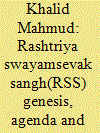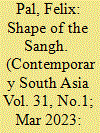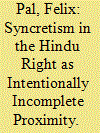| Srl | Item |
| 1 |
ID:
135575


|
|
|
|
|
| Summary/Abstract |
The political landscape of India witnessed a historical about-turn when the Bharatiya Janta Party (BJP) decisively ended the decade-long political monopoly of the Indian National Congress (INC). it goes without saying that the unprecedented victory of the BJP in the recent elections has out-distanced even its own major success of 1998. No doubt, there are a number of crucial factors which paved the way for its resounding success. one of course, is the political and ideological vacuum created by the rival INC. this said, however, this paper seeks to uncover other distinct and multifaceted factors which led to the overwhelming rise of the tide of Hindutva, and this despite the fact that India is touted as being a secular and pluralistic democratic state.
|
|
|
|
|
|
|
|
|
|
|
|
|
|
|
|
| 2 |
ID:
096825


|
|
|
|
|
| Publication |
2010.
|
| Summary/Abstract |
How do national and political identities impact on a state's foreign policy? In turn, how does the analysis of different normative beliefs advance our understanding of India's foreign policy during the National Democratic Alliance (NDA) period? This article utilises a norm-based approach to investigate the composite entrenched beliefs underpinning Indian foreign policy. Such an approach generates historically contingent understandings of foreign policy beliefs across different political generations and ideologies. By focusing on pre-1998 Indian government and Bharatiya Janata Party (BJP) foreign policy norms, and comparing them with the actions of the BJP-led NDA in government, the paper assesses whether differing ideological beliefs either constrain or influence (Indian) foreign policy. In particular, two elements of Indian foreign policy are analysed-dealing with Pakistan and going nuclear-in order to evaluate continuity and change in the formation and development of foreign policy in India. It is found that although the BJP-led NDA were frequently constrained by underlying norms present in Indian foreign policy, their own established policy beliefs often challenged these norms and influenced new foreign policy directions.
|
|
|
|
|
|
|
|
|
|
|
|
|
|
|
|
| 3 |
ID:
056854


|
|
|
| 4 |
ID:
192305


|
|
|
|
|
| Summary/Abstract |
The Indian Hindu nationalist movement is largely sustained by a network, hundreds of organisations strong, linked in greater or lesser degrees to a central organisational node: the Rashtriya Swayamsevak Sangh. In this paper I propose a new, critical, definition of this network: That which is constituted by organisational sites through which a central executive may exert authority, (a) through existing institutionalised communication channels, and (b) without coercion. By reconfiguring the analytic focus on this network, which I refer to as the Sangh, from its organisational nodes, to the linkages through which power travels, I propose a new research agenda on this Hindu nationalist organisational network that I argue more clearly identifies the spread, intentions and weaknesses of the far-right in India.
|
|
|
|
|
|
|
|
|
|
|
|
|
|
|
|
| 5 |
ID:
184238


|
|
|
|
|
| Summary/Abstract |
Religious syncretism can function as an instrument of inter-group control and domination. Rather than consistently promoting cross-religious forbearance and knowledge, syncretism enables a proximity that allows forms of violence otherwise inaccessible to religious majoritarian groups. By choreographing performances of syncretism between themselves and a subordinate religious community, organizations like the Indian Hindu nationalist Rashtriya Swayamsevak Sangh (RSS) produce an intentionally incomplete proximity. This proximity draws close minority groups like the RSS’ Muslim wing, the Muslim Rashtriya Manch, but without allowing final inclusion or incorporation. Muslim proximity to the RSS becomes a spectacle of humiliation and domination rather than a measure of inclusion into the Hindu right. Muslims must perform Hindu nationalist religious rituals, while denigrating mainstream Islamic tradition. Drawing on extensive interview-based fieldwork with the RSS and the Manch, I argue that syncretism can function as domination because it reinforces ethnic hierarchies, but that this domination is not a form of hierarchical encompassment. Rather, subordinate religious groups are kept in a perpetual humiliating limbo as a way to reify the superiority of a dominant religious group.
|
|
|
|
|
|
|
|
|
|
|
|
|
|
|
|